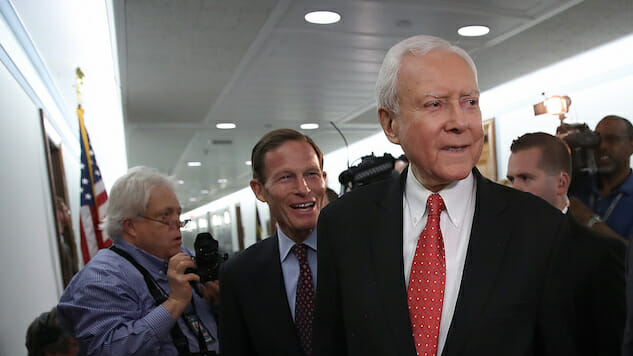Music Modernization Act Unanimously Passes the House, Goes to Trump
Photo by Win McNamee/Getty
Years after the idea was first introduced, the Music Modernization Act has finally cleared both congressional hurdles and was passed, unanimously, by the House of Representatives on Sept. 25.
Before the vote, the bill was renamed the Orrin G. Hatch-Bob Goodlatte Music Modernization Act to honor both Senator Orrin G. Hatch and House Judiciary Chairman Bob Goodlatte, both retiring and both instrumental in securing its passage. A version of the bill was passed by the House earlier this year, with the Senate making a few changes and unanimously passing an amended version on Sept. 18. The version passed in the House yesterday underwent no reconciliation, with the House accepting the changes earlier this month. Just as before, the MMA aims to adapt current copyright law to be more workable in the age of digital streaming. For those unfamiliar, you can find a deeper look at the changes included in the bill in Paste’s previous coverage here.
However, the MMA hasn’t crossed the finish line just yet, as it now goes to President Donald Trump to be signed into law. Trump then has 10 days to sign the bill, though if he chooses not to and Congress is still in session, the bill will still become law.
Senator Hatch, one of the principle champions of the effort, delivered celebratory remarks on the Senate floor directly addressing the president.
“As you can see, Mr. President, the Orrin G. Hatch-Bob Goodlatte Music Modernization Act is a comprehensive piece of legislation that will have wide-ranging impacts across the music landscape. It touches all sectors of the music industry and makes important reforms to ensure that songwriters, musicians, and other key contributors to American music are treated fairly,” said Sen. Hatch. “There’s a reason this bill passed the Senate unanimously, and why it will shortly pass the House with overwhelming support. And that’s because all sides of the music industry came together to find a way to make our music laws better. To make them function properly. To update them for the digital age. No side got everything it wanted. But everyone got something. And at the end of the day, we have a piece of legislation we can all be proud of.”
Just as when the MMA passed the Senate just a week ago, a plethora of stakeholders in the music industry released statements praising the bill and, just as equally, the industry behind it. After years of advocacy, yesterday’s progress felt hard-won.
President of the Recording Industry Association of America (RIAA), Mitch Glazer, wrote a guest piece in Variety praising the move and those he felt were most instrumental.
“One major reason for the advancement of the Music Modernization Act is that we all diligently worked to realize a broader good, to recognize that our power lies not within one music constituency, but is only truly impactful when we join together to speak with one voice with and for each other,” wrote Glazer. “We could do that, in part, because a foundation of trust was built. Every major artist organization joined with organizations representing record labels, publishers, songwriters, performing rights organizations and producers to discuss legislative language and changes.”
“When the voices behind those songs and recordings speak out, as they did here in social media posts, op-eds, ads and calls to Members of Congress, they are a powerful force for change,” continued Glazer. “We saw it firsthand with the advocacy behind the Music Modernization Act. To the thousands of artists and songwriters who spent countless time advocating for change, we are deeply grateful.”
David Israelite, CEO of the National Music Publishers Association, also issued a statement thanking those who “carried [the] bill across the threshold.”
“This was not an easy process, but it has galvanized the entire industry behind the songwriters, artists, producers and composers whose voices carried this bill across this threshold,” said Israelite. “After many months moving through Congress, we are thrilled to see the Music Modernization Act officially passed. Now, only days stand between tonight’s House vote and this bill becoming law. We thank our champions, Congressmen Doug Collins, Hakeem Jeffries, Bob Goodlatte and all of the Members, who again voted unanimously to improve the lives of millions of music creators and fans.”
-

-

-

-

-

-

-

-

-

-

-

-

-

-

-

-

-

-

-

-

-

-

-

-

-

-

-

-

-

-

-

-

-

-

-

-

-

-

-

-








































